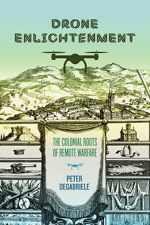Today, we are happy to bring you our conversation with Peter DeGabriele, author of Drone Enlightenment: The Colonial Roots of Remote Warfare.
What inspired you to write this book?
The original impetus for this book had to do with a feeling that there was a disconnect between the self-congratulatory liberalism of the United States after the election of Barack Obama, and the increasingly colonialist foreign policy that Obama pursued. I saw this feeling brilliantly encapsulated in a series of memes posted on Tumblr entitled “Texts from Drone.” The memes contrasted Obama’s self-image as a liberal President who believed in the rule of law and the social safety net, with the brutal reality of drone assassination that expanded under his watch. I became particularly interested in how the legitimization of remote assassination related to the concept of the State and to theories of warfare that were originally developed during the European Enlightenment.
What did you learn and what are you hoping readers will learn from your book?
While reading about drone warfare I learned about the stark differences between the image projected to the public of a mode of clean and responsible killing, and the messy, violent, and often haphazard nature of drone strikes. Many of these details are available to the American public thanks to some fantastic journalism from writers at the New York Times and Los Angeles Times especially. What I hope readers take from my book is the extent to which drone warfare functions in a similar way to the violence exercised in colonial territories throughout the 18th century, and that right when the Enlightenment was developing liberal theories that limited warfare and state power, colonial violence was accelerating. This is, I think, a pattern that we are repeating.
What surprised you the most in the process of writing your book?
I have been constantly surprised by the number of people who share my interest in drone warfare. People I have talked to about my research seem genuinely concerned that decisions that are taken concerning acts of war tend to sidestep normal political processes. This is especially concerning for the future of democracy, and one of the conclusions that I came to that surprised me the most was that drone warfare is about the erosion of the conditions of transparency that are necessary for democracy. It is not only that no country policed by killer drones piloted remotely by a foreign power can become an autonomous polity, but that no country that wages war without the knowledge or consent of its population can really be democratic.
What’s your favorite anecdote from your book?
This is really difficult to answer because many of the ‘anecdotes’ from the book are about brutal killing, and anecdotes are usually supposed to be fun and light. However, part of the research for the book meant reading a lot about European natural law, and especially laws concerning the hunting of wild animals. There are really fascinating debates about, for instance, whether a boar wounded on one person’s land but captured or claimed on another’s is the property of the hunter, or one of the land owners. The not very fun and light side of this anecdote is that it is this form of law which seems most appropriate to describe how drone warfare functions, rather than those which govern warfare between human populations.
What’s next?
Writing Drone Enlightenment has inspired me to think more carefully about the legacy of the Enlightenment in the contemporary world. Recently I have become interested in the consequences of the removal of art and artifacts from their original owners and producers and their placement in European museums and collections. I would like to work on researching some of the contexts in which this happened in 17th and 18th century Europe and relate it to Europe’s construction of itself during the same period as the apex of human civilization. I think that work like this might, like Drone Enlightenment, force us to reevaluate the European Enlightenment from the effects of its continuing colonial consequences, and not from its own idealistic statements about itself.





